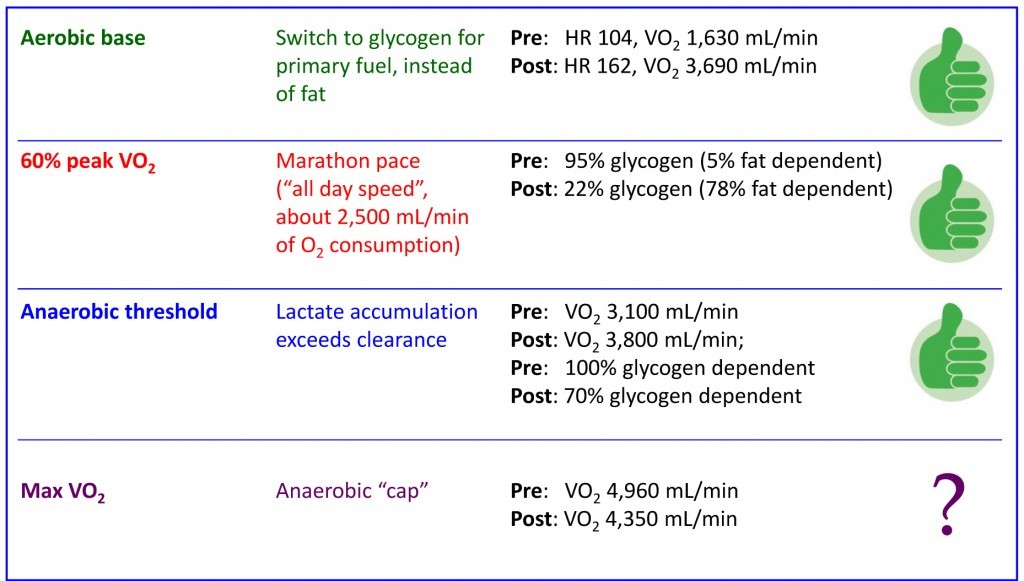This is a study that did a 6 year followup of 14 contestants of the Biggest loser.
#Before the show
body weight (avg): 148.9 ± 40.5 kg
Body Fat: 73.4 ± 22.6 kg
LBM: 75.5 ± 21.1 kg
RMR: 2,607 ± 649 kCal/d
Exercise: 5.6 ± 1.8 kCal/kg/d
They spent 30 weeks eating less (but still insulinogenic food) and moving more
#After 30 weeks of eat less, move more
Weight: 90.6 ± 24.5 kg
Body Fat: 26.2 ± 13.6 kg
LBM 64.4 ± 15.5 kg
RMR: 1,996 ± 358 kCal/d
Exercise: 10.0 ± 4.6 kCal/kg/d
#6 years later
Weight: 131.6 ± 45.3 kg
Body Fat: 61.4 ± 30 kg
LBM 70.2 ± 18.3 kg
RMR: 1,903 ± 466 kCal/d
Exercise: 10.1 ± 4.0 kCal/kg/d
So on the show they almost doubled their exercise from 5.6 to 10.0 kCal/kg/day. Over the 30 days they lost an average of 58.3 kgs, 47.2 kg of that was fat and 11.1 kgs lean body mass, and their resting metabolic rate dropped from 2607 kCal/day to 1996.kCal/day.
6 years later they were still exercising 10.1 kCal/kg/day but now they had gained back 41 kg of the weight they had lost, and only put back on half of the lean body mass that they lost during the show. The tragedy was that their metabolic rate was even lower after 6 years than it was at the end of the show.
This is what happens when you follow the strategy of reducing calories in: and increasing calories out. If you don’t lower insulin, your body tries to preserve it’s stored energy so your body goes looking for energy savings (reducing your resting metabolic rate), making you hungry (which thanks to the prize money they were apparently able to ignore) and burning energy sources OTHER than fat … namely lean body mass. They also burned a lot of fat too but all the way that high insulin level was fighting them.
At the end of the show they kept up everything they had learned, kept up exercising, kept eating insulinogenic foods but now the prize money wasn’t dangled in front of them … hunger contributed to them eating just enough calories to put on some of that weight again but because they were still fighting insulin their metabolic rate remained depressed.
One interesting aside to this study that no-one has spoken about was that they tracked their respiratory quotient which tells you what energy substrates they were using for energy. 1.0 is carbohydrate, 0.8 is protein and 0.7 is fat.
At the start of the competition their RQ was 0.77 (mostly fat and a little carbohydrates and protein)
At the end of the competition their RQ was 0.75 (even more fat, a little less carbohydrates and protein)
6 years later their RQ was 0.81 (mostly protein, equal amounts fat, and carbohydrates)
This is why it is bad to restrict calories below satiation. That lowers your metabolic rate and that stays low until you put back on all the body fat that your body wants at your insulin level. Meanwhile your body goes looking for energy sources and it will use sources of protein not required for immediate survival.
This is why people on a ketogenic diet who stall and decided now is the time to restrict calories and go hungry … end up losing lean body mass unless they dramatically increase their protein intake. They stall because they reach their level on insulin resistance, restricting calories lowers their MBR and goes looking for protein to burn (extra dietary protein defrays that) but if they are insulin resistant that protein raises insulin and fights further weight loss even harder.
As soon as they are tired of slow MBR and constant hunger they yo-yo back up to the body fat level their insulin has set for them.
http://onlinelibrary.wiley.com/doi/10.1002/oby.21538/full



